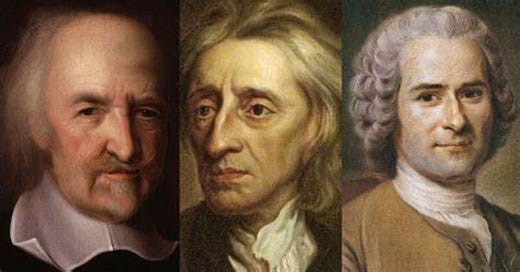Introduction:
At its most basic level, the social contract theory is the idea that we live in a society where there is an “agreement” between the ruler and ruled on what their roles in that society will be. In the earlier ages, it was said that people were born into a world filled with an anarchic nature “which was happy or unhappy according to the particular version of the theory.” This then led to a society and government being formed by a “social contract.”
This idea can be sparsely traced back to thinkers, like Socrates, but the three prominent figures from the 17th-18th centuries associated with this idea are Thomas Hobbes, John Locke, and Jean-Jacques Rousseau, which is what I am focusing on.
Thomas Hobbes:
Hobbes believed that human nature was “solitary, poor, nasty, brutish and short.” (Leviathan, i. xiii. 9). He believed that the state of society could only be peaceful if individuals voluntarily gave up their freedoms by knowing that they would descend into chaos and violence if left alone. Hobbes was a huge supporter of a strong authoritarian figure, which to him was Leviathan, and that there is no one above this absolute authority. This social contract allows for people to enter “civil society” as long as the political state is intact.
John Locke:
Locke’s view completely differs from Hobbes, in the sense that he believed humans were born with a blank state. This means a person’s ideas come from things they see and experience. He also thinks that human nature wouldn’t fall into chaos if left alone, but rather find a way to better themselves and the society around them. Locke believed in a representative democracy where the people have the right to select leaders who make decisions on their behalf. Additionally, if the people don’t feel like they are being represented appropriately, they have the power to overthrow these leaders in elections.
Jean-Jacques Rousseau:
With Rousseau, I feel like he’s almost a happy medium between Hobbes’ and Locke’s descriptions of this theory. He believes that people are free when they are governed by their own laws. Hobbes and Rousseau both agree that the world Locke speaks about would ultimately lead to destruction, but Rousseau thinks that people, in exchange for their independence, would receive “a better kind of freedom, namely true political, or republican, liberty.” Instead of someone fully giving up their rights or having complete freedom, society should surrender their individualism for the “general will” of the community. So, if there is a law that society as a whole deems best, individuals should go along with it, regardless of their personal view.
Conclusion:
In modern societies, we can see all three social contract theories still being implemented. These ideas that Hobbes, Locke, and Rousseau had still have impact today.
If you’re interested to continue learning, here are some good links and readings that helped me:
https://www.britannica.com/topic/social-contract/The-social-contract-in-Rousseau
https://iep.utm.edu/soc-cont/#H2
Leviathan (1651) by Thomas Hobbes
The Second Treatise on Civil Government (1689) by John Locke
The Social Contract (1762) by Jean-Jacques Rousseau
Korczyk's Class and CrashCourse on YouTube has some videos over this too :)




